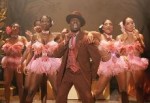A glittering dress and a musical mess

Idlewild is a bloated, pop culture-bastardizing musical set in prohibition-era rural Georgia starring Andre Benjamin and Big Boi, the artists behind Outkast.
Because Outkast is largely considered one of the creative forces behind the continued evolution of the modern hip hop movement, the hype surrounding the two-hour music video was accordingly massive.
Following in the tradition of modern critically acclaimed musicals such as Moulin Rouge and Chicago, Idlewild falls woefully short of its potential and expectations.
The opening credits are exceptionally well done, as they set the scene in 1930s Georgia with pictures that come to life before the viewer, promising a visually spectacular and innovative film.
The film that follows is pleasing to the eye but leaves the rest of the senses dulled.
Rather than innovation, Idlewild employs tired scenes from modern culture. The movie even finds time to insert a The Matrix-style bullet-time scene in which Big Boi’s character Rooster dodges bullets as he jumps through a door. Chase scenes are reminiscent of Indiana Jones, while the cabaret scenes are saturated in flair but lack the substance of Moulin Rouge.
Continually predictable, the movie lacks the freshness that has defined Outkast’s career to this point. The predictability is mirrored in the music, which also falls short of expectations. Outkast’s perennially funky, often-imitated hip hop epics are replaced by boring, awkward hip hop apologetics for getting rich or dying trying.
The editing proves to be more ungainly than the prohibition-era gangsta rap, as chronological flow is abandoned for a Pulp Fiction approach. This leads to a disjointed story that flows about as well as George W. Bush at a spelling bee.
The story is so passé that even Andre Benjamin’s signature charisma isn’t enough to pull the character development out of the gutter. The writing evokes very little empathy in characters before they are cut down in flamboyant gangland style. The end result is an overblown story full of disposable faces that seem to be included just to beef up the already heavy marquee listings.
The film is full of popular names, but the best performance is tendered by relatively unknown Paula Patton, who plays the female lead, Angel. She offers a character that is at once emotional and inspired. She plows through the bad writing and shines. Surprisingly, Big Boi, a relative newcomer to cinema, sees more screen time than his counterpart. Big Boi’s Rooster escapes the stereotypical gangsta role as he portrays a not-so-typical tough guy with tangible vulnerability.
Unfortunately, the performances of these lesser-known actors are drowned in the quagmire of “named” actors such as Terrence Howard and Macy Grey, who should have been killed in the opening seconds to save the audiences time.
Rather than attempting a Purple Rain-esque full length, perhaps Outkast would have been better served by following Michael Jackson’s example. “Thriller” was 13 minutes long and is widely considered to be the best music video ever. It seems that Outkast has enough substance to compete with “Thriller” had the movie only stuck to a similar format.
In the end, Idlewild is a brightly flamboyant presentation of a lukewarm story. It’s a neon blanket stifling the flames of a few good performances and will be remembered as a low point in the otherwise brilliant careers of Outkast.





